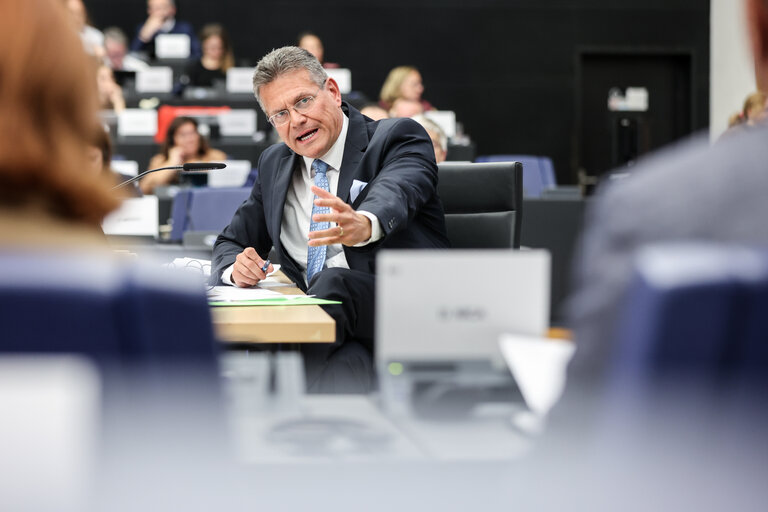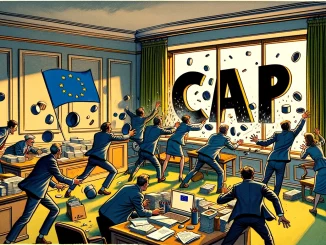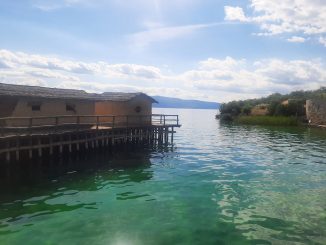
European Commission Vice-President Maroš Šefčovič’s pitch to take over as Green Deal chief has fallen flat after failing to answer MEPs calls for details and timelines of the core sustainability files still missing in action.
In a three-hour hearing, which took place on Tuesday (3 October), the Green Deal chief hopeful faced questions from MEPs to ascertain his suitability to fill the shoes of EU juggernaut Frans Timmermans, who stepped down from the role to run in the Dutch elections.
It comes as the fate of a number of core Green Deal agrifood files hang in the balance, including an overhaul of the EU’s animal welfare legislation, as well as the overarching sustainable food systems (SFS) law, which aims to accelerate and facilitate the transition to sustainable food systems.
After a grilling from a number of cross-party lawmakers from four committees of the European Parliament, Šefčovič maintained he is “fully aware” of the importance of the files the Commission has yet to put forward, promising to “seek further work” on these dossiers.
Given the looming EU elections, the window of opportunity for presenting outstanding files is rapidly closing. But, pressed for concrete details on timelines, Šefčovič remained vague.
“The work is very clear on some files, more advanced on others, and therefore I’m telling you what we know that we can clearly deliver. But I’m also […] saying where we still need more assessment, more work to be invested in these very demanding and important files,” he added.
He also suggested that some, such as the SFS law, may suffer further delays, despite the acknowledgement that “we are in a situation that every day, every week counts”.
However, he promised that, if he wins their support, the Commission will “come back to [lawmakers] with a very clear timeline of outstanding files”.
Animal welfare
One of the biggest bones of contention was the delay over the presentation of the overhaul of the EU’s animal welfare legislation.
While a draft of the final proposal already passed the first quality control check, progress has been stalling on the proposal, despite the fact that multiple sources have indicated that it is technically ready to go.
Calling it a “complex and complicated file,” Šefčovič stopped short of offering a firm date, but stressed that work was ongoing on the file.
“I can assure you that we know that the citizens want us to come up with the animal welfare [proposal] and when it is ready, we clearly will put it on the table,” he said.
While the nod to animal welfare was welcomed among stakeholders, campaigners lamented Sefcovic’s lacklustre commitment.
“Further delaying the publication of the proposals to the next term would be a democratic failure,” Reineke Hameleers, CEO of campaign group Eurogroup for Animals said, stressing the need to see these files “before the end of the year”.
Meanwhile, Olga Kikou, head of Compassion in World Farming EU, warned that if this continues, the “chasm between the EU and citizens grows deeper, and that more voters will turn to anti-EU political parties during the elections next year”. However, Šefčovič did offer a glimmer of hope for the proposal on protection of animals during transport, one of the four that makes up the animal welfare package, saying that he thought it will be “ready soon”. “We are the most advanced [on] the part of animal welfare which is linked with animal transport,” he said, adding that, while he cannot give a precise date, it will “come soon”. In extra written answers to MEPs, Šefčovič has since pencilled this for December, 2023 (see link below)
2023.10.04 – EVP Sefcovic – Additional EP questions
Bridge-building vs legally binding
Instead of concrete commitments, the Green Deal chief wannabe chose to impress the importance of bridge-building with farmers to find “common solutions”.
“We have seen probably too much of this divisive approach and the polarisation on some of these files,” he said in a veiled criticism of his predecessor.
Taking a leaf out of Commission President Ursula von der Leyen’s playbook, the climate chief hopeful called instead for ‘strategic dialogues’ with farmers.
This is needed in particular to move ahead with discussions on the nature restoration law, according to Sefcovic, who stressed that getting this file over the finishing line would be “very important signal for [the] world, for Europe, for farmers, and also citizens”.
The law, which aims to restore the EU’s degraded ecosystems, also has a number of provisions related to farming, such as compensation measures for landowners and implications for CAP funding. Inter-institutional talks with the EU ministers, known as ‘trilogues’, already kicked off on 19 July.
His words will be welcomed by the more than 200 civil society organisations that joined forces in a joint statement this week to call upon all EU institutions to push ahead on the file.
But the renewed focus on strategic dialogue has sparked wariness in some stakeholders. “It seems like we are entering a new phase of dialogues at the detriment of legally binding instruments,” according to environmental lawyer and head of Client Earth Europe, Anaïs Berthier who stressed that discussions with farmers, industry and civil society “can’t be an excuse to delay” key reforms.
After failing to impress Environment Committee coordinators, Šefčovič, alongside another Commissioner-hopeful, Wopke Hoekstra, were asked to answer additional written questions.
The plenary is then expected to hold a formal vote on both on Thursday (5 October).
More
French CAP Strategic Plan : EU Sued over Approval of the Plan






